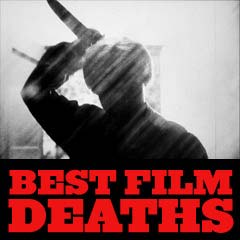
|
Deaths Scenes 1993 |

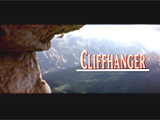
|
Cliffhanger (1993) In the opening tense scene of director Renny Harlin's action film, an operational rescue on a steep towering 4,000 foot mountain peak in the Rocky Mountains was being attempted. Hot-shot rescue worker Gabe Walker (Sylvester Stallone) climbed up to where the two stranded climbers were perched on a narrow ledge - knee-injured Hal Tucker (Michael Rooker) and his girlfriend Sarah (Michelle Joyner). With assistance from a rescue helicopter, Walker called for a transport line, and a steel cable was lowered from the chopper and then extended over to another landing area where the chopper landed. Hal was the first to harness himself and pull himself over on the taut cable to the chopper. When it was nervous Sarah's turn (after Walker called it "the best ride in the park"), and she was assured: "There's nothing to it," she found herself dangling over the deep chasm when her harness broke.
Walker made the risky decision to go out on the line and daringly rescue her. She reached up with her right hand to grab Walker's hand - and was suspended in mid-air by her one hand, while screaming out: "I can't hold on..I don't want to die...I'm slipping...Please don't let me fall." But she found herself slipping and losing her grip, and when her glove came off in Walker's hand, she fell to her death in the abyss below. |
 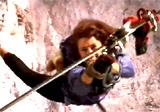 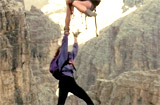 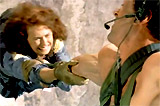 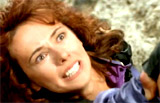
|
|||||||||

|
Groundhog Day (1993) Director Harold Ramis' comedy posited that Pittsburgh TV meterologist Phil Connors (Bill Murray) was forced to repeat the same day (February 2nd) over and over again, beginning at 6 am (with his clock radio playing Sonny & Cher's "I Got You, Babe"). He was in the town of Punxsutawney, Pennsylvania to cover the annual Groundhog Day festivities. Once Phil Connors realized he would be repeatedly reincarnated, he become seriously depressed and snapped, telling co-news producer Rita (Andie MacDowell): "I've come to the end of me. There's no way out now." He looked for ways to end the cyclical loop of life. He committed numerous acts of suicide (none of which killed him permanently):
Shortly afterwards, he told Rita: "I'm a god...I'm a god. I'm not the God, I don't think." He explained further: "I didn't just survive a wreck. I wasn't just blown up yesterday. I have been stabbed, shot, poisoned, frozen, hung, electrocuted, and burned." Waitress Doris (Robin Duke), who was waiting on their table showed extreme consternation. And then he added: "And every morning, I wake up without a scratch on me, without a dent in the fender. I am an immortal." Doris interrupted for their order: "The special today is blueberry waffles....I could come back if you're not ready." Later, he confessed to Rita: "I've killed myself so many times, I don't even exist anymore." |
 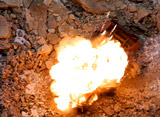 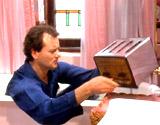 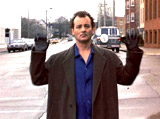 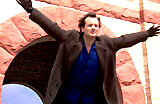
|
|||||||||

|
Jurassic
Park (1993) Steven Spielberg's adventure film (with science-fiction elements) was a big hit in the early 1990s, becoming one of the highest-grossing films of all time. It was notable for its groundbreaking CGI special effects and won the Best Visual Effects Oscar. In Jurassic Park (a theme park populated with dinosaurs and other prehistoric life) located on an island off Costa Rica, a giant, ferocious, carnivorous Tyrannosaurus Rex (computer-generated and modeled) attacked the stranded tour cars. It occurred at the same time that the park's security system was shut down. Cowardly lawyer Donald Gennaro (Martin Ferrero) abandoned the kids, Lex Murphy (Ariana Richards) and younger brother Tim (Joseph Mazzello). He fled to a flimsy, thatch-roofed toilet shack where he thought he could be undetected in one of the stalls. The T-Rex first demolished the wooden shack by bursting through its coed-signed front door and collapsing its four walls, revealing him helplessly cowering and sitting there.
With his hiding place demolished, the dinosaur approached, chomped into him, picked him up, swung him around and then feasted on him in one large bite. |
 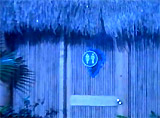 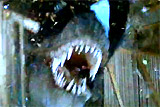 |
|||||||||

|
Manhattan Murder Mystery (1993) Woody Allen's hilarious comedy was an ode to The Thin Man (1934), Rear Window (1954), and The Lady From Shanghai (1948). The latter classic film noir served as the backdrop for the climax of the film. The famous "Hall of Mirrors" scene from the 1948 film was cleverly recreated in the film's conclusion, set in the back of an old revival theatre. The characters reenacted the scene - life imitating art - as it played behind them on the screen. When wife murderer Paul House's (Jerry Adler) spiteful paramour-accomplice Mrs. Gladys Dalton (Marge Redmond) appeared, she confronted him with a gun, and shot him dead:
|
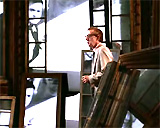 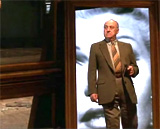 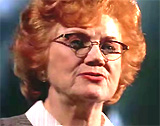 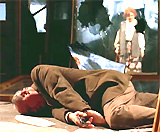
|
|||||||||

|
Philadelphia (1993) Producer/director Jonathan Demme's dramatic film was one of the first realistic, big-budget, mainstream Hollywood treatments of AIDS (it came after the HBO-TV docu-drama And the Band Played On (1993)), garnering two Oscars (Best Actor for Tom Hanks, and Best Original Song, "Streets of Philadelphia" by Bruce Springsteen). In the film's final hospital scene, dying AIDS patient Andrew Beckett (Tom Hanks) was with his long-term male lover Miguel Alvarez (Antonio Banderas). Family and friends had just bid him farewell. His father briefly said: "Goodnight, son. Try to get some rest, okay? Okay. I love you, Andy." His supportive mother Sarah (Joanne Woodward) had whispered: "Goodnight, my angel. My sweet boy." Alone when he dimmed the lights, Andrew told Miguel: "Miguel, I'm ready," and then removed his own oxygen mask.
In the final scene during the reception held in the Beckett home following the funeral, mourners watched home movies of Andrew's younger days. |
  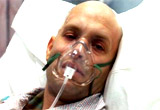
|
|||||||||

|
The Piano (1993, NZ/Australia/Fr.) As mute, stubborn, pale-skinned 19th century Scottish woman Ada McGrath (Oscar-winning Holly Hunter) was being taken away on a Maori boat, she asked erotic partner and tattooed estate-manager George Baines (Harvey Keitel) to throw the "spoiled" piano overboard. The piano plunged into the sea and began to drown Ada underwater - her leg had become ensnared by the piano's rope. She sank with it - attached to it by the rope, but then decided against suicide (while envisioning her own death) and chose to live:
She kicked free from her boot and swam back to the surface, where she was reborn. She was hauled onto the boat by natives. In the film's epilogue, Ada told about her new life:
(As the camera continued to pull back, Ada was seen dead, still tied to the piano. Had her reverie of rebirth and life been only a fantasy at the moment of her death?)
Ada's last sentence, and the last line of the film was a Thomas Hood quote: "There is a silence where hath been no sound. There is a silence where no sound may be. In the cold grave under the deep deep sea." |
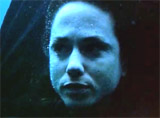 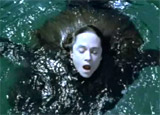  Near-Drowning |
|||||||||

|
Shadowlands (1993, UK) In this tearjerking British romance-biopic film by director Richard Attenborough, bachelor Oxford University author C. S. "Jack" Lewis (Anthony Hopkins) (of The Narnia Chronicles) established a platonic yet loving relationship with feisty American fan, a divorced poet named Joy Gresham (Debra Winger), whom he eventually befriended and married. Lewis chronicled his own reactions to Joy's premature death in 1960 in his book A Grief Observed (1961) - the inspiration for the film. Realizing she didn't have much time to live, with death imminent from advanced cancer (of the bone), he proposed to her (and shortly later married her) in her London hospital room:
And then, remarkably, Joy went into remission ("could be months, could be weeks") but the cancer was still very advanced and she would not live for another year. She was removed from the London hospital and taken to Lewis' home in Oxford. They experienced some very happy moments together, but then the pain and cancer returned. After a kiss, and then after a period of sleep, she admitted she was tired and about to die ("I just don't wanna leave you...Too much pain...You have to let me go...I've loved you so"). He tried to comfort her, and then prayed when she expired:
Then, he abruptly shared tortured grief and uncontrollable weeping with her young son Douglas (Joseph Mazzello) in an attic setting:
At Joy's service, the minister intoned: "We therefore commit the body of thy servant, Joy to the elements: Earth to earth, ashes to ashes, dust to dust." Lewis was told: "Thank God for your faith, Jack. Only faith makes sense of times like this. I know." Following Joy's death, Lewis was in shock, but remained stoic and resigned to her death, although he was confused about the brutal fact of human suffering and death: "I can't see her anymore. I can't remember her face... I'm so afraid of never seeing her again. Of thinking that suffering is just suffering after all. No cause. No purpose. No pattern...There's nothing to say. I know that now. I've just come up against a bit of experience, Warnie. Experience is a brutal teacher. But you learn. My God, you learn." He even questioned his own faith and God:
|
 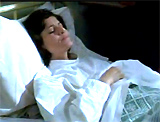 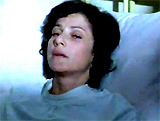 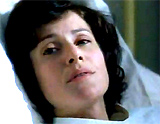 Joy's Advanced Cancer Diagnosed 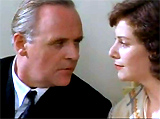 Getting Married in the Hospital 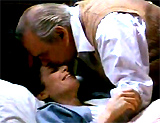 Soon to Die 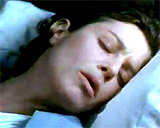 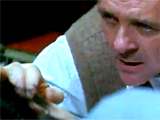 Joy to Lewis: "You have to let me go" 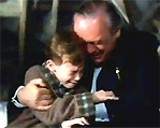 C.S. Lewis Grieving with Stepson Douglas |
|||||||||
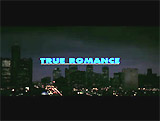
|
True Romance (1993) Ex-cop and security guard Clifford Worley (Dennis Hopper) endured a torture interrogation conducted by Sicilian mobster Vincenzo Coccotti (Christopher Walken). After being threatened "Make your answers genuine," Worley was asked about the whereabouts of his fleeing son Clarence (Christian Slater) after he had committed a cocaine drug deal theft. Knowing that he would die anyway, Worley responded with bold and inflammatory insults (involving both eggplants and cantaloupes!) Vincenzo had seemed to be amused by Worley's rambling, insulting chatter about his own personal history and how his Sicilian parentage was spawned from "n---ers":
Coccotti laughed, insulted back: "You're a cantaloupe," stood up, kissed Worley on one cheek, walked away, then turned around with an automatic, put the barrel to Worley's skull, and pumped six bullets into his head and body, claiming: "I haven't killed anybody since 1994." |
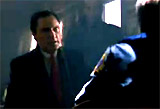 Vincenzo Interrogating Worley    Shot in the Head |
|||||||||
(chronological by film title) Intro | 1915-1929 | 1930-1933 | 1934-1938 | 1939 | 1940-1942 | 1943-1945 | 1946-1947 | 1948-1949 1950-1952 | 1953-1955 | 1956-1957 | 1958-1959 1960-1961 | 1962-1963 | 1964-1966 | 1967-1968 | 1969-1970 1971 | 1972 | 1973 | 1974 | 1975 | 1976 | 1977-1978 | 1979 1980 | 1981 | 1982 | 1983 | 1984 | 1985 | 1986 | 1987 | 1987 | 1988 | 1989 1990 | 1991 | 1992 | 1993 | 1994 | 1994 | 1995 | 1995 | 1996 | 1997 | 1998 | 1998 | 1999 2000-2001 | 2002 | 2003 | 2004 | 2005 | 2006 | 2007 | 2008 | 2009 | 2010 | 2011 |